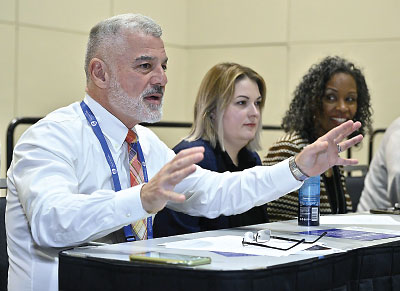APA Foundation Launches Pilot Campaign To Change Culture Around Seeking Treatment
Abstract
“Mental Health Care Works” is focused on encouraging people with mental health challenges to take the first step toward getting help. It will be a multi-tiered effort with high-impact media, including TV, billboards, and social media.
A pilot program for a new APA Foundation (APAF) public awareness initiative, “Mental Health Care Works,” was launched in July with advertising campaigns in Denver, Raleigh/Durham, North Carolina, and the Washington, D.C./Baltimore area.
The campaign, whose goal is to change the culture around seeking treatment for mental illness and substance use disorders, will be launched nationally next January. APA is seeking feedback from members during the pilot phase; they should post their comments on APAF’s website.
“To make mental wellness a mainstream priority—that is what this campaign is all about,” said Rawle Andrews Jr., Esq., executive director of the APAF, as he introduced the campaign during APA’s 2023 Annual Meeting in San Francisco.
“This is the first positive mental wellness campaign we believe has ever been launched,” Andrews said. “The reason I say this is because we are not going to be talking about stigma as all the other great anti-stigma campaigns of the past have done. They moved the dial, but they didn’t set the temperature. This campaign is designed to reset the temperature entirely so that we will prioritize mental health in the same way we have prioritized physical health.”
Mental Health Care Works is focused on encouraging those with concerns about their mental health or that of a friend or loved one to take the first step toward getting help. It will be a multi-tiered effort, reaching people throughout the day with high-impact media, including TV, billboards, and social media. The pilot campaign includes colorful billboard ads featuring three characters rebounding after receiving mental health treatment: Lizzie, a teenager; Simone, a mother with a young infant; and Diego, an older man.
Local and national organizations and influencers are also involved. The APAF is working on the campaign with Finn Partners, a global marketing agency.

APA President Petros Levounis, M.D., M.A., urged APA members to spread the word about the APA Foundation’s new campaign. At right are Vedrana Hodzic, M.D., of the APA Foundation; and APA Trustee-at-Large Michele Reid, M.D.
Joining Andrews at the Annual Meeting session were incoming APA President Petros Levounis, M.D., M.A.; APA CEO and Medical Director Saul Levin, M.D., M.P.A.; APA Trustee-at-Large Michele Reid, M.D.; Vedrana Hodzic, M.D., the APAF’s director of fellowships, mentoring, and medical education; Fiona Fonseca, M.D., M.S., a 2022-2023 APA/APAF/SAMHSA Diversity Leadership Fellow; Nicole Del Castillo, M.D., M.P.H., a member of the APAF Board of Directors; and Kevin Earley, M.S.W., a peer support specialist in Arlington, Va. Earley is the son of Pete Earley, best-selling author and mental health advocate.
Partnering with patient groups and allied medical groups is an important part of the campaign. “The community of addiction specialists has a long tradition of working with people who live with substance use disorders, and nothing is more relevant than working closely with groups like Alcoholics Anonymous and other mutual help groups,” said Levounis, whose presidential theme this year is “Confronting Addiction From Prevention to Recovery.” “People with lived experience of mental illness and substance use disorders need to be respected, as do those with medical expertise.”
Kevin Earley, who was featured in the Ken Burns 2022 PBS documentary “Hiding in Plain Sight,” is witness to the possibility of recovery and the possibility for society to change. “I am seeing the needle move in terms of talking about mental illnesses. When I was first diagnosed in 2001, it was something you kept to yourself. Now we have prominent athletes like Simone Biles withdrawing from Olympic events because of mental health concerns. There is a lot of love and support from the younger generation who see mental health and mental illness differently.”
Everyone’s recovery is personal. He noted that before receiving his master’s degree, he had a job pushing shopping carts in the parking lot of Home Depot. “Sometimes recovery looks like bagging groceries at Walmart,” he said. “Society may not applaud that or acclaim it, but if you look at the journey someone may have been through, that might be a real height for them. They have a fulfilling purpose and a duty, they have coworkers and loved ones, they have a community.”
Mental Health Care Works is ultimately about starting the conversation—person to person. “It’s great to have a national platform, but you also need to have these conversations when you are having dinner with family and friends,” Earley said. “You need to be radically authentic with that small sphere of people who care most about you.” ■
Resources
Information about Mental Health Care Works
Comments about the pilot program can be entered on the APAF’s website.
Information about Finn Partners



